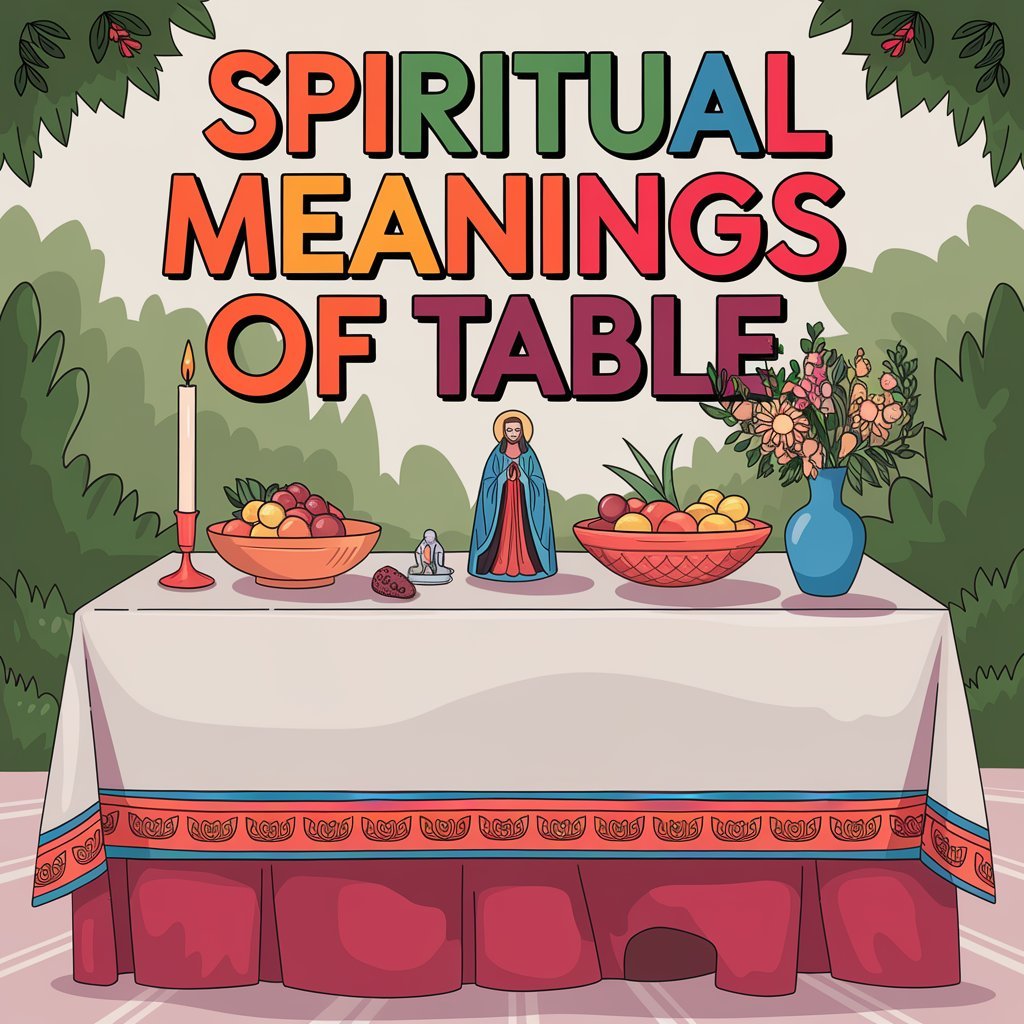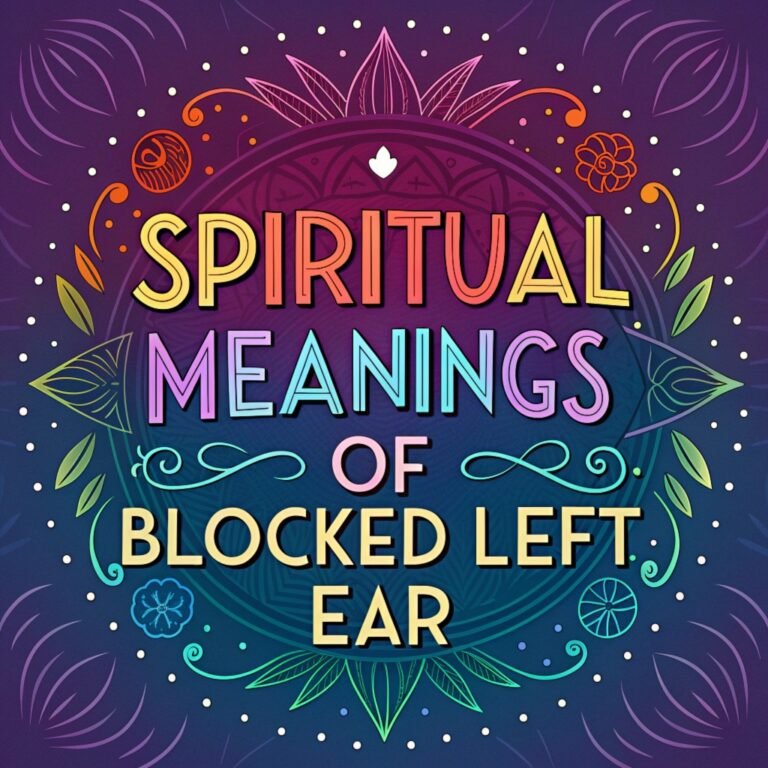11 Spiritual Meanings of Table: A Guidance To Reveal The Secrets
As you explore the Bible, you’ll notice that tables play a significant role in shaping the narrative of faith. From the sacred furniture in the Temple to the intimate gatherings of Jesus and His disciples, tables become more than just pieces of furniture – they symbolize community, covenant, and divine provision.
You’ll discover that the tables in Scripture hold profound spiritual meaning, revealing God’s faithfulness, redemption, and promises. But what exactly do these tables represent, and how do they transform into altars of worship? As you examine the tables in the Bible, you’ll uncover a deeper understanding of God’s presence in your life.
Key Takeaways
- In the Bible, the table symbolizes community, fellowship, and unity, representing a space where individuals come together to share experiences and forge lasting connections.
- The Table of Showbread in the biblical Tabernacle signifies the covenantal relationship between God and His people, with 12 loaves of bread representing the 12 tribes of Israel.
- The table embodies God’s promise of provision and abundance, manifesting in the perpetual presence of fresh bread, symbolizing God’s unwavering commitment to nourish and sustain His people.
- The Lord’s Table in Communion is a sacred ritual where bread and wine symbolize Christ’s broken body and spilled blood, inviting individuals to introspectively examine their relationship with the divine.
Tables of Fellowship and Unity

Frequently, in religious and cultural contexts, you gather around tables that embody fellowship and unity, where shared meals and communal experiences forge bonds and strengthen relationships.
These tables symbolize the foundation of community building, where individuals come together to share stories, break bread, and forge lasting connections.
Family gatherings, in particular, are pivotal in fostering a sense of belonging and togetherness.
As you sit around the table, you’re not just sharing a meal, you’re sharing experiences, values, and traditions that shape your identity.
The Table of Showbread Explained
As you explore into the rich symbolism of the biblical Tabernacle, the Table of Showbread emerges as a pivotal element, where twelve loaves of bread, representing the twelve tribes of Israel, were arranged in two rows of six, symbolizing the covenantal relationship between God and His people.
This bread arrangement wasn’t just a random display; it held deep spiritual significance.
The priests were responsible for preparing and placing the bread on the table, a duty that underscored their role as intermediaries between God and humanity.
This priestly duty was a reminder of God’s faithfulness to His people and the importance of covenant obedience.
God’s Provision and Abundance
Within the sacred context of the Tabernacle, the Table of Showbread embodies God’s promise of provision and abundance, manifesting in the perpetual presence of fresh bread, which symbolizes His unwavering commitment to nourish and sustain His people.
You’re invited to partake in this divine feast, where the bread represents the heavenly manna that satisfies your deepest hungers.
In this sacred space, you’ll experience God’s lavish provision, reminiscent of the Divine Banquets described in scripture.
As you sit at His table, you’re reminded that you’re not just a guest, but a beloved child, worthy of His abundant love and care.
In this feast, you’ll discover freedom from want and lack, as you revel in the richness of God’s provision.
Tables of Judgment and Accountability
While the Table of Showbread symbolizes God’s abundant provision, you now stand before a different kind of table, one where your actions are scrutinized and your heart is laid bare, as the tables of judgment and accountability summon you to give an account of your deeds.
Here, you’re subject to divine assessment, where every thought, word, and action is weighed and measured. You’re called to give an account of your life, and moral scrutiny is the standard by which you’re judged.
Your motivations are examined, and your intentions are exposed.
Your choices are evaluated, and the consequences of your decisions are revealed.
Your heart is laid bare, and the true nature of your character is disclosed.
The Lord’s Table in Communion
At the Lord’s Table in Communion, you partake in a sacred ritual where the bread and wine serve as tangible symbols of Christ’s broken body and spilled blood, inviting you to introspectively examine your relationship with the divine.
This Sacred Feast is a Divine Invitation to reconcile with God, acknowledging the sacrifice that set you free from the bondage of sin.
As you receive the bread and wine, you’re reminded of the price Christ paid for your redemption.
This communion isn’t just a ritual, but a powerful declaration of your dependence on God’s grace.
It’s an opportunity to realign your heart with His, embracing the freedom and forgiveness He offers.
Covenant and Promise of God

When you gather around the table, you’re not just sharing a meal, but entering into a sacred covenant with God, where His promises become the foundation of your faith.
This Divine Commitment is a sacred bond between you and your Creator, where He commits to guide, protect, and provide for you.
As you sit at the table, you’re reminded of God’s faithfulness and His desire to have a personal relationship with you.
His promises are the foundation of your faith, giving you hope and confidence in His goodness.
The table represents a sacred space where you can come boldly before God, knowing He’s always faithful to His promises.
Through this covenant, you’re freed from the bondage of sin and empowered to live a life of freedom and purpose.
Tables as Altars of Worship
As you experientially engage with God’s promises at the table, you transform this ordinary piece of furniture into an altar of worship, where your praise, gratitude, and surrender converge in a dynamic expression of devotion.
In this sacred space, you create an atmosphere conducive to Holy gatherings, where the divine and human intersect.
The table becomes a platform for intimate communion with God, where you can freely express your emotions, desires, and aspirations.
As you surrender your life to God, you experience freedom from the shackles of fear, doubt, and anxiety.
The table, once a mere piece of furniture, is now a symbol of liberation, where you can encounter the living God and experience the transformative power of His presence.
Unity and Togetherness
The concept of unity and togetherness is deeply rooted in the symbolism of tables. When we gather around a table, we create a space for connection, community, and shared experiences. This unity and togetherness can be seen in various aspects of our lives, including:
- Family Bonding: Tables provide a space for families to come together, share meals, and bond over conversations.
- Community Building: Tables can be used to build community, where individuals from different backgrounds come together to share experiences and connect with each other.
- Cultural Exchange: Tables can represent cultural exchange, where individuals from different cultures share their traditions, customs, and values.
- Spiritual Connection: Tables can be used to connect with the divine, where individuals gather to share spiritual practices, prayers, and rituals.
The unity and togetherness that tables represent can have a profound impact on our lives, including:
- Increased empathy: When we share experiences with others, we develop a deeper understanding of their perspectives and challenges.
- Stronger relationships: Tables provide a space for building and strengthening relationships, whether it’s with family, friends, or community members.
- Sense of belonging: When we gather around a table, we feel a sense of belonging and connection to others.
- Personal growth: Shared experiences around a table can lead to personal growth, as we learn from others and develop new skills and perspectives.
By recognizing the power of unity and togetherness that tables represent, we can create spaces that foster connection, community, and shared experiences.
Abundance and Prosperity
In many cultures and spiritual traditions, a well-stocked table is seen as a symbol of abundance and prosperity. The table represents a space where individuals can come together to share in the blessings of life, and the abundance of food and drink on the table is a manifestation of the divine’s provision and care.
Aspects of Abundance and Prosperity
A table filled with abundance and prosperity can represent various aspects of our lives, including:
- Material wealth: A well-stocked table can symbolize material wealth and financial security.
- Spiritual nourishment: A table filled with spiritual nourishment, such as sacred texts, candles, and incense, can represent spiritual growth and enlightenment.
- Emotional fulfillment: A table filled with loved ones, laughter, and joy can represent emotional fulfillment and happiness.
- Community and connection: A table filled with people from different backgrounds and cultures can represent community and connection.
Communication and Connection

Tables have long been a symbol of communication and connection, providing a space for people to come together, share ideas, and build relationships. Whether it’s a family dinner table, a conference table, or a coffee shop table, the table serves as a hub for connection and communication.
Aspects of Communication and Connection
A table can represent various aspects of communication and connection, including:
- Verbal communication: A table provides a space for people to engage in verbal communication, sharing ideas, thoughts, and feelings.
- Nonverbal communication: A table can also facilitate nonverbal communication, such as body language, facial expressions, and tone of voice.
- Emotional connection: A table can be a space for emotional connection, where people share their feelings, empathize with each other, and build deeper relationships.
- Intellectual connection: A table can also be a space for intellectual connection, where people share ideas, debate, and learn from each other.
Hospitality and Generosity
Hospitality and generosity are at the heart of table culture, where individuals come together to share meals, stories, and experiences. A table is not just a physical space, but a symbol of warmth, welcome, and generosity.
Aspects of Hospitality and Generosity
A table can represent various aspects of hospitality and generosity, including:
- Welcoming others: A table can be a space where we welcome others, making them feel at home and included.
- Sharing resources: A table can be a space where we share our resources, whether it’s food, drink, or time.
- Showing kindness: A table can be a space where we show kindness, compassion, and empathy to others.
- Creating community: A table can be a space where we create community, building relationships and connections with others.
Frequently Asked Questions
What Is the Significance of Tables in Hebrew Culture and Tradition?
You discover that in Hebrew culture and tradition, tables symbolize family gatherings, unity, and cultural heritage, serving as a central hub for sharing stories, passing down traditions, and strengthening family bonds, reflecting the community’s deep-seated values.
Are Tables Mentioned in the New Testament as Well as the Old?
You’ll find tables mentioned in the New Covenant, particularly in the context of table fellowship, where Early Christians gathered to share meals, fostering community and unity, as seen in Luke 24:30-31 and Acts 2:46.
Can Tables Be Seen as Symbols of Spiritual Growth and Maturity?
As you reflect on your faith journey, you’ll realize that tables can indeed symbolize spiritual growth and maturity, representing soul nourishment and intimacy with the divine, where you’re fed and sustained for the next leg of your transformation.
How Do Tables Relate to the Concept of Hospitality in the Bible?
As you explore the concept of hospitality in the Bible, you’ll find tables play a pivotal role in facilitating sacred gatherings and festive celebrations, fostering an atmosphere of warmth, generosity, and communal connection.
Are There Any Specific Dimensions or Materials Required for Biblical Tables?
When you examine ancient tables, you’ll find that specific dimensions and materials weren’t explicitly required, but ancient craftsmanship and sacred geometry played a significant role in their design, reflecting a deep understanding of harmony and balance.
Conclusion
As you sit at the table, you enter a sacred space where divine provision, covenant, and communion converge.
You’re not just sharing a meal, but participating in a rich tapestry of spiritual significance.
The table transforms into an altar of worship, where your praises, gratitude, and surrender create an atmosphere of holy gathering.
In this sacred space, God’s promises become the foundation of your faith, and His presence is palpable.

Liza Stockholm is an esteemed spiritual guide and the visionary behind Spiritual with Liza. With a profound passion for empowering others on their spiritual journey, Liza offers a blend of educational content and personal guidance. Her expertise in spirituality is rooted in years of dedicated practice and study, making her a trusted companion for those seeking enlightenment and inner peace.







